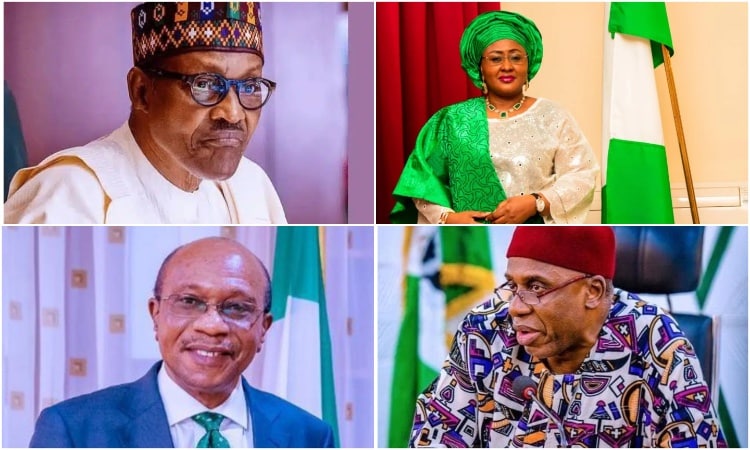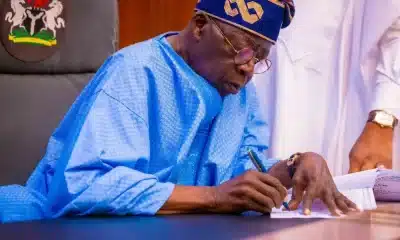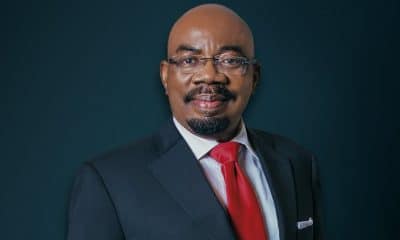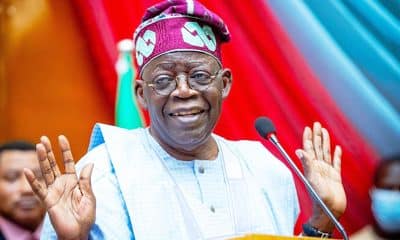Gist
Where Are They? Five Most Influential Figures During Buhari Administration

Former President Muhammadu Buhari concluded his eight-year tenure as Nigeria’s leader on May 29, 2023, as he officially handed over power to his successor, President Bola Tinubu.
Throughout his administration, Buhari was surrounded by a cadre of influential individuals, including relatives, aides, ministers, governors, and senators, all of whom played pivotal roles in shaping his policies, projects, and political landscape.
As the Buhari era recedes into history, let’s examine the current positions and activities of the five powerful individuals, both men and women, who played crucial roles during that time according to premium politics.
Aisha Buhari, the former first lady of Nigeria, known for her advocacy of women’s and children’s rights and criticism of certain aspects of her husband’s government, has since left the presidential villa.
She relocated to London, where she is currently pursuing a PhD in International Relations at the University of Westminster. Additionally, Aisha Buhari actively manages a charity foundation named Future Assured, which is dedicated to the well-being, education, and empowerment of women and youths.
Tunde Sabiu, the nephew and personal assistant to President Buhari, held a position of significant influence in the presidency, marked by controversy. Accusations of involvement in dubious deals and contracts, along with allegations of exerting undue influence over the president, surrounded him.
His appointment as an assistant director in the National Intelligence Agency generated public outrage and suspicion. Following Buhari’s departure, Sabiu faced legal troubles, including charges of unlawfully owning a shotgun and numerous cartridges. Although granted bail, he was subsequently re-arrested by the secret police outside the court, and his trial is still in progress.
Godwin Emefiele, the Central Bank of Nigeria’s governor, held a prominent and enduring position within Buhari’s administration. During his tenure, he implemented an interventionist currency policy that infused the foreign exchange market with billions of dollars to support the naira.
In addition, Emefiele introduced a multiple exchange rate system to obscure pressure on the naira and deter devaluations. His suspension by President Tinubu on June 9, 2023, led to the appointment of Folashodun Shonubi, a former deputy governor of the CBN, as his successor.
Emefiele faced legal consequences, being charged and remanded in prison for procurement fraud. This involved awarding contracts exceeding N500 billion to companies associated with him and his cohorts. However, on January 8, 2024, an Abuja court ruled against his re-arrest, imposing a N100 million fine on the Economic and Financial Crimes Commission for his prolonged detention without trial.
Rotimi Amaechi, the former governor of Rivers State and minister of transportation, emerged as one of the most dedicated and outspoken members within Buhari’s cabinet. His tenure witnessed the revitalization and expansion of Nigeria’s rail network, along with notable advancements in the maritime and aviation sectors. Amaechi played a pivotal role in the All Progressive Congress and served as the director-general for Buhari’s campaign organization during the 2015 and 2019 elections.
In 2022, he made the decision to step down from his ministerial position to pursue the presidency within the APC. Despite securing the second position in the party’s primaries, he conceded the victory to Tinubu. Currently, Amaechi holds the position of the leader of the opposition in the Senate, representing Rivers East district. Additionally, he is actively pursuing a law degree from the University of Port Harcourt.
Ibikunle Amosun, the ex-governor of Ogun State and a two-term senator, maintained a strong alliance with and backing for Buhari. His pivotal role in securing the southwest region for the APC during the 2015 and 2019 elections showcased his influence and support.
Amosun actively spearheaded various infrastructural projects in Ogun State, including the construction of roads, bridges, schools, and hospitals. Following the conclusion of his second term as governor in 2019, he transitioned back to the Senate, representing Ogun Central district. Additionally, he assumed the role of chairman of the Senate Committee on Capital Markets.












